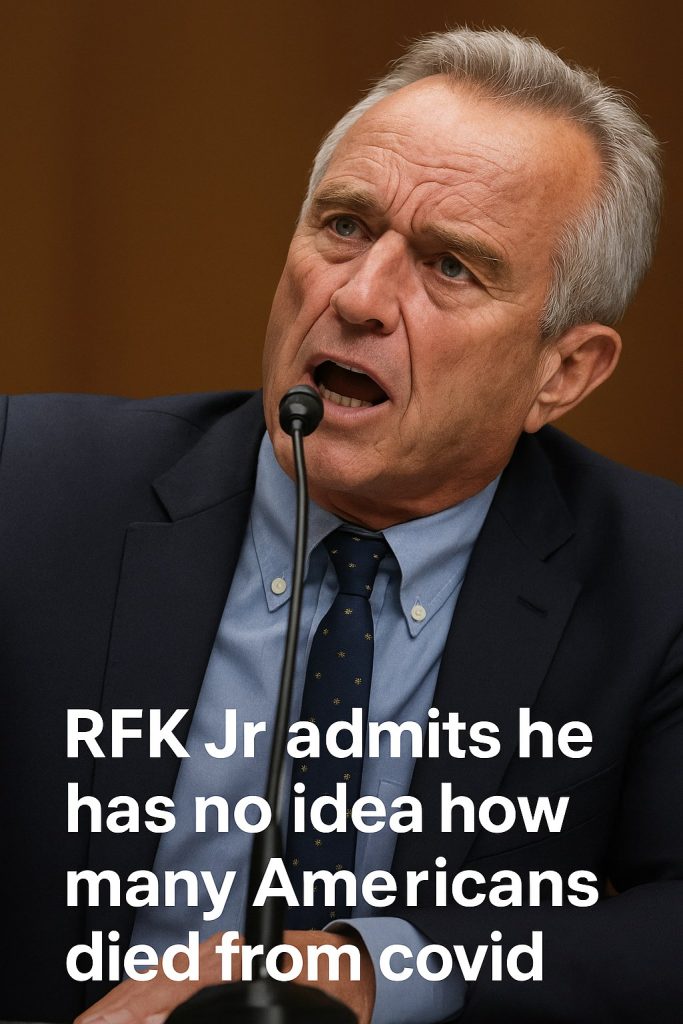In a contentious Senate hearing on Thursday, September 4, 2024, Health and Human Services Secretary Robert F. Kennedy Jr. made a startling admission: he does not know the exact number of Americans who have died from COVID-19. The revelation came during a heated exchange where Kennedy also laid blame on the Biden administration for the ongoing consequences of the pandemic.
The hearing, convened to discuss public health responses and the management of COVID-19 data, quickly turned combative as senators pressed Kennedy for clear answers. When asked about the total documented fatalities attributed to the coronavirus, Kennedy acknowledged uncertainty, stating that he was “not sure” of the precise death toll. This admission was met with surprise and criticism from both lawmakers and experts, given the critical role of the Department of Health and Human Services (HHS) in pandemic data collection and dissemination.
“We have been tracking this for years, yet I cannot give you a definitive number of COVID-19 deaths in America,” Kennedy said. “The data is inconsistent, and the administration’s policies have not helped in clarifying these figures.” He then accused the Biden administration of obscuring information and mishandling the pandemic response, suggesting that inconsistent policies and delayed measures contributed to a higher death toll.
The U.S. COVID-19 death toll has been a subject of intense scrutiny since the beginning of the pandemic. Official counts reported by federal agencies place the number at over one million deaths. However, discussions around underreporting, variation in state reporting methods, and excess mortality figures have fueled debate over the true impact of the virus in the United States.
Kennedy’s comments have amplified public confusion surrounding the pandemic’s legacy, prompting calls for greater transparency and improved data accuracy from public health officials. Critics argue that as HHS Secretary, Kennedy’s role includes providing clear, evidence-based information to guide public understanding and policymaking.
During the hearing, several senators challenged Kennedy’s statements, emphasizing the importance of relying on verified data collected by institutions such as the Centers for Disease Control and Prevention (CDC). Several highlighted independent analyses of mortality that align closely with reported figures, notwithstanding some margin of error.
Further complicating the discussion was Kennedy’s pointed criticism of the federal government’s vaccination campaigns and public messaging strategies. He suggested that failures to address vaccine hesitancy and inconsistent guidance exacerbated the pandemic’s toll.
Following the hearing, social media rapidly circulated an image of Kennedy alongside a bold text caption that read: “RFK Jr admits he has no idea how many Americans died from COVID.” The post sparked widespread reactions, ranging from disbelief to calls for administrative accountability.
Public health experts emphasize that while no data system is flawless, the extensive collection and analysis of COVID-19 statistics by federal and state agencies provide a reasonably accurate picture of the pandemic’s severity. They urge officials to focus on improving data quality and communication to prevent misinformation and strengthen preparedness for future health crises.
This hearing highlights ongoing tensions between policymakers and public health authorities as America continues navigating the pandemic’s long-term effects. As debates over the accuracy of COVID-19 statistics persist, the urgency for clear, reliable health data remains paramount.



